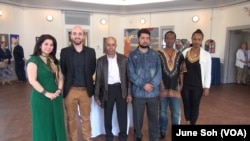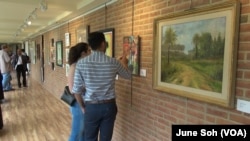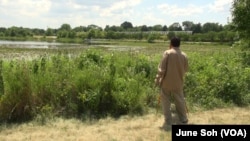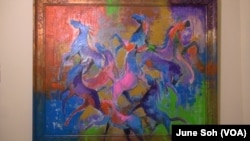Refugees carry few material possessions when they flee war, violence or persecution in their homelands. But they do bring talent and skill to their new countries.
At the Sandy Spring Museum in Sandy Spring, Maryland, that talent is on display in an exhibit of six refugee artists from Iraq, Ethiopia and Somalia.
Some of the displayed works depict the refugee artists' memories of their homelands.
"My hometown is Wollo," explained Ethiopian artist Fetun Getachew. "There is a marketplace once a week. People meet there at the markets for not only buying or selling, [but] just meet together for so many purposes."
Iraqi artist Ahmad Alkarkhi contributed a landscape of his country. "I want to show Americans good things about my country," he said. "This beautiful landscape, no war or different things."
But coming to a new country inevitably changes the work. For Alkarkhi, it has added color.
"In my country, we don't have a lot of color there, just gray and brown," he said. "Here, I saw four seasons clear. I saw many colors. This ... change[s] my art, and I need to add more colors to my painting."
In an unincorporated community of about 6,000 people near Washington, D.C., the museum considers itself a "living history museum," but not in the conventional sense in which museums employ re-enactors to depict history.
Rather, Sandy Spring is a place where the community can gather and "have unexpected encounters," according to the museum website. "It means having cultural artists create experiences for the entire community to enjoy."
Museum executive director Allison Weiss thinks this particular exhibit says a lot about the contributions of refugees.
"There's so much talk in the news now about refugees, and how many people we should let into the country, and what are they contributing," Weiss said. "And I think this exhibit shows that there's individuals behind the word refugees and they have all sorts of talents that maybe we're not hearing about from the news."
Dancing with colors
Alkarkhi works in maintenance at an apartment complex in Riverdale, Maryland. But at night and on the weekends, he can be found in front of a canvas set up in the living room of his small apartment.
"Painting for me [is] like music. Each painting, different music. I just tell myself, 'Let me dance with colors on the canvas,'" he said.
Alkarkhi graduated from the University of Baghdad, College of Fine Arts. He was a well-known artist in Iraq until violence forced him to flee to Syria in 2006. But war came there, too. Once again, he was uprooted, relocating three years later to Riverdale with his wife and two children.
Alkarkhi said creating art is his way to give back to America for helping him and his family build a new life in safety.
"America gives refugees a lot of things. I want to do beautiful painting, and I give it to this country and to the people to enjoy with my art," he said.
Alkarkhi is also painting his experiences as a refugee in his new color palette, as in his piece, "Colorful Horses."
"These horses are like refugees. Some from Europe, some from Africa, some came from [the] Middle East. And they come here, they work together, live together, do many things together," he explained.
"Then, after like 10, 20 years, everybody say I am American. And everybody try to do something good for this country."









